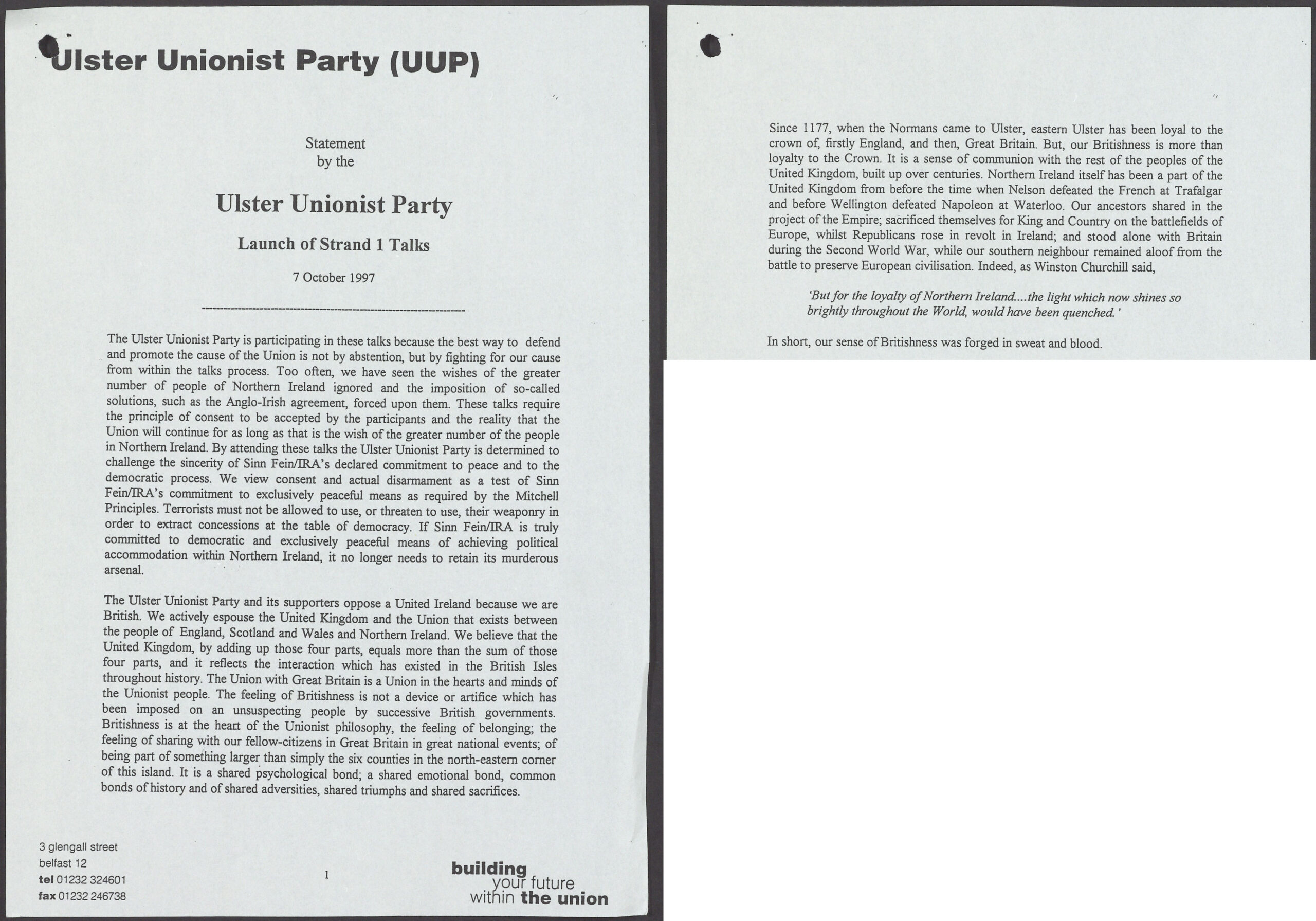
Extracts from an opening statement by Ulster Unionist Party (UUP), which was led by David Trimble, at the peace talks in Stormont, Belfast, on 7 October 1997. Catalogue reference: PREM 49/403
Transcript
Ulster Unionist Party (UUP)
Statement
by the
Ulster Unionist Party
Launch of Strand 1 Talks
7 October 1997
The Ulster Unionist Party is participating in these talks because the best way to defend and promote the cause of the Union is not by abstention, but by fighting for our cause from within the talks process. Too often, we have seen the wishes of the greater number of people of Northern Ireland ignored and the imposition of so-called solutions, such as the Anglo-Irish agreement, forced upon them. These talks require the principle of consent to be accepted by the participants and the reality that the Union will continue for as long as that is the wish of the greater number of the people in Northern Ireland. By attending these talks the Ulster Unionist Party is determined to challenge the sincerity of Sinn Fein/IRA’s declared commitment to peace and to the democratic process. We view consent and actual disarmament as a test of Sinn Fein’s commitment to exclusively peaceful means as required by the Mitchell Principles. Terrorists must not be allowed to use, or threaten to use, their weaponry in order to extract concessions at the table of democracy. If Sinn Fein/IRA is truly committed to democratic and exclusively peaceful means of achieving political accommodation within Northern Ireland, it no longer needs to retain its murderous arsenal.
The Ulster Unionist Party and its supporters oppose a United Ireland because we are British. We actively espouse the United Kingdom and the Union that exists between the people of England, Scotland and Wales and Northern Ireland. We believe that the United Kingdom, by adding up those four parts, equals more than the sum of those four parts, and it reflects the interaction which has existed in the British Isles throughout history. The Union with Great Britain is a Union in the hearts and minds of the Unionist people. The feeling of Britishness is not a device or artifice which has been imposed on an unsuspecting people by successive British governments. Britishness is at the heart of the Unionist philosophy, the feeling of belonging; the feeling of sharing with our fellow-citizens in Great Britain in great national events; of being part of something larger than simply the six counties in the north-eastern corner of this island It is a shared psychological bond; a shared emotional bond, common bonds of history and of shared adversities, shared triumphs and shared sacrifices.
Since 1177, when the Normans came to Ulster, eastern Ulster has been loyal to the crown of, firstly England, and then, Great Britain. But, our Britishness is more than loyalty to the Crown. It is a sense of communion with the rest of the peoples of the United Kingdom built up over centuries. Northern Ireland itself has been a part of the United Kingdom from before the time when Nelson defeated the French at Trafalgar and before Wellington defeated Napoleon at Waterloo. Our ancestors shared in the project of the Empire; sacrificed themselves for King and Country on the battlefields of Europe, whilst Republicans rose in revolt in Ireland; and stood alone with Britain during the Second World War, while our southern neighbour remained aloof from the battle to preserve European civilisation. Indeed, as Winston Churchill said,
But for the loyalty of Northern Ireland…the light which now shines so brightly throughout the World, would have been quenched ‘
In short, our sense of Britishness was forged in sweat and blood.
[Footer of the paper reads:]
3 glengall street
Belfast 12
tel 01232 324601
fax 01232 246738
building your future within the union
« Return to The road to the Belfast (Good Friday) Agreement (KS3)
- Read the first section. Why does the UUP say they are participating in these peace talks?
- What might we reasonably infer by the fact that they are defending their decision to take part?
- Do you think the UUP believes that Sinn Fein’s commitment to peace is sincere? How can you tell?
- Read the second section. What are the UUP opposed to?
- How would you sum up the theme of the second section?
- Read the third section. Which two historical figures are mentioned? Why do you think this is?
- What is the impact of the final sentence?
